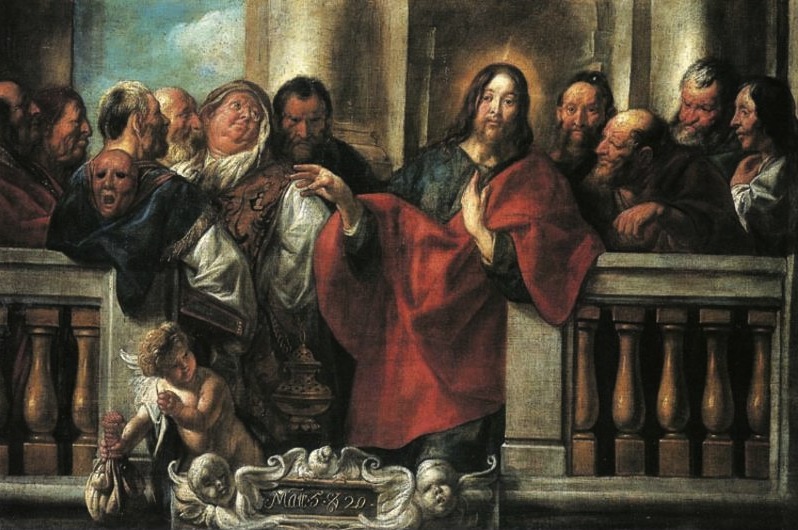By GARY ALLEY
February 2015
Once, Jesus was asked by a biblical scholar,
“Which commandment is the most important of all?”
Jesus answered, “The most important is:
‘Listen, Israel, the Lord our God, the Lord is one.
You will love the Lord your God with all your heart, with all your soul,
with all your mind, and with all your strength.’ (Mk 12:29-30)
In his response about the greatest commandment, Jesus quoted from the book of Deuteronomy, and more specifically, a passage of scripture known as the “Shma” within Jewish tradition.[1] Dt 6:4-5 is a command to the people of Israel to follow God’s Law completely and unequivocally. This call to obedience is curiously phrased as “love.” How can one command love? Who can command that love?

Only a king can.
More than three millennia ago, powerful kings controlled not just their own people but other lands and rulers. To maintain their requisite loyalty, covenants were written between these “big kings” and other “little kings.”[2] Political loyalty in the Ancient Near East was typically expressed by the term “love.” “Loving the king with one’s entire heart signified the severance of all contact with other political powers.”[3]
What was a political oath of allegiance in the Ancient Near East was reconfigured as a vow of faithfulness to the one God of Israel. In contrast to the surrounding gods, the Lord permitted no other rival. He allowed no compromise in love.
Is it any wonder that Jesus’ repeated message to his people was the Kingdom of God? He reminded them that the Lord was still their king and He demanded from them their love and loyalty. Jesus’ Kingdom movement epitomized this unconditional surrender to the Lord—“No one who puts a hand to the plow and looks back is fit for service in the Kingdom of God.”[4]
Additionally, Jesus included a second commandment to further clarify the extent of this loyal love. [5]
The second commandment is: ‘You will love your neighbor as yourself.’
There is no other commandment greater than these.”
The expert in the law said to him, “That is true, Teacher; you are right…
[these] are more important than all burnt offerings and sacrifices.” (Mk 12:31-32a, 33b)
Our love for others, like our love for God, is emphatically commanded—you will love. The same covenantal language is applied. Just as we are brought into a relational agreement with the Lord, so too, we are wedded in covenant with our neighbor. If we want to enter Jesus’ Kingdom movement, there are no other options but this loyal love for our fellow man.
Not surprisingly this story of the biblical scholar[6] and Jesus ended with…
When Jesus saw that he had answered thoughtfully, he said to him, “You are not far from the kingdom of God.” (Mk 12:34)
It is hard enough that God asks us for our undivided loyalty. Harder still is being loyal to my brother or sister. Working out what this loyal love looks like on a daily basis is a Kingdom challenge and prerogative.
Whoever claims to love God yet hates a brother or sister is a liar.
For whoever does not love their brother and sister, whom they have seen,
cannot love God, whom they have not seen. (I John 4:20)
[1] The Shma, Shema, or Sh’ma is Dt 6:4-9. The first word in Hebrew in this passage is “shma”, meaning listen, hear, or obey. It has been used as Jewish liturgy for more than 2,000 years.
[2] There are two groups of ancient historical documents which provide information on this political practice—the Late Bronze Age Hittite and the Neo-Assyrian vassal treaties. The Hittite kingdom was located in modern day Turkey, and the Assyrians were found in the area of today’s northern Iraq.
[3] Weinfeld, 81. Deuteronomy and the Deuteronomic School, Oxford: Clarendon (1972).
[4] Lk 9:62
[5] Scholarship has noted that Jesus was a part of a larger Jewish phenomenon in the first century which understood “love of neighbor” as encapsulating the Law. For example, see Hillel’s discussion with a would-be pagan convert to Judaism: “A pagan came to him saying that he would convert to Judaism if Hillel could teach him the whole of the Torah in the time he could stand on one foot. Rabbi Hillel replied, ‘What is hateful to yourself, do not do to your fellow man. That is the whole Torah; the rest is just commentary. Go and study it.’ (b.Shabbat 31a)” Also Rabbi Akiqva was quoted as saying the whole of Torah was summed up by loving your neighbor as yourself. (b.Sanhedrin 38a; Midrash Tanchuma, Parshat Pinchas, sec. 10) Also see the Apostle Paul in Rom 13:8-10 and Gal 5:14.
[6] I have idiomatically translated Mk 12:28’s “εἷς τῶν γραμματέων” or “one of the scribes” as “biblical scholar” because of the first century Jewish scribe’s function as an expert of the biblical text.
![]()
